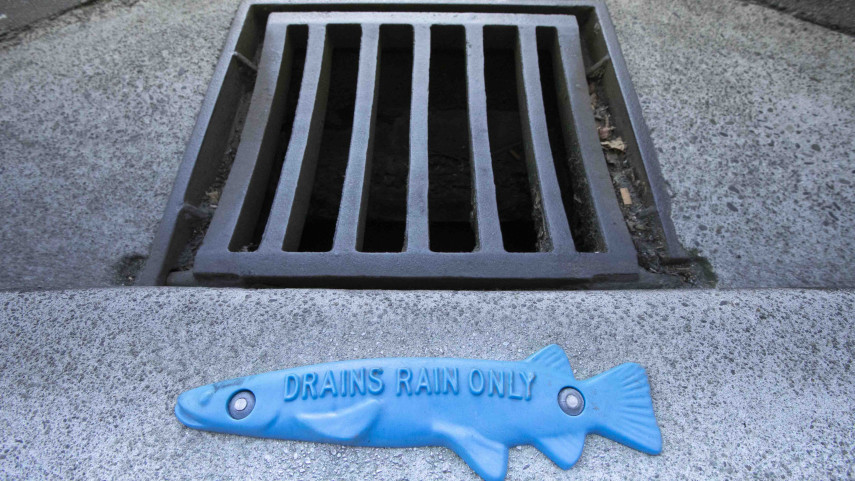
Protect our waterways by becoming a stormwater superhero

Share this story
You are all probably familiar with the stormwater grates on the side of the road but how many of you stop to think about where the stormwater drains actually lead?
How to be a Stormwater Superhero
- Wash your car on the grass verge or gravel. This helps filter out the pollutants, so they don’t run straight down the drain.
- When painting around the house, wash brushes in the laundry sink, not directly into the stormwater drain.
- Take a bag with you when walking your dog, so you can pick up its poo and dispose of it properly.
- Next time you get the brakes changed on your car, ask about copper-free pads.
- If you see soil on footpaths, roads, or entering waterways, use the Snap Send Solve app to let councils know.
- Make an effort to pick up rubbish like cigarette butts and bits of plastic near your property. Every piece you collect is one less for your local stream.
Check out ecan.govt.nz/stormwater for more ways to become a Stormwater Superhero.
Many people assume that whatever travels down these drains gets treated, but in most situations, this is not the case.
In urban areas of Canterbury, stormwater drains usually lead directly to waterways. This means that chemicals and contaminants that enter this system go directly to streams, wetlands, and the sea.
It’s a problem that continues to threaten Canterbury’s water quality and aquatic life, and comes at a cost to ratepayers. Councils can spend millions each year on construction and maintenance to improve stormwater quality.
Increasing awareness of stormwater health
If you didn’t know this – you’re not alone.
A 2018 Christchurch City Council survey found 42 percent of respondents either didn’t know where stormwater flows to or thought it went to a treatment plant.
To help address this issue, Environment Canterbury and the three central water zone committees (Christchurch West Melton, Banks Peninsula, and Selwyn Waihora) have launched a campaign to encourage people to become a Stormwater Superhero – at home, with the car, and in the workplace.
They are asking everyone to do their bit to make our waterways cleaner, healthier, and safer.
What is stormwater?
Stormwater is water that runs off hard surfaces like roofs, driveways and roads. On its journey to the drain, it picks up a whole heap of other nasties, like cigarette butts, sawdust, spills and soil, that end up in our rivers and streams.
Common household activities like car washing, rinsing paintbrushes, DIY and even driving your vehicle all contribute to the degradation of stormwater health. Car brake pads contain fine particles of copper and other metals which are deposited on roads. When it rains, these enter the stormwater system.
Other contributors include zinc from tyre wear and runoff from galvanised iron roofs.
How bad is the contamination?
Information provided by Christchurch City Council paints a sobering picture of the scale of contamination.
It's estimated that each year the following amounts of contaminants collectively enter the Ōpāwaho/Heathcote, Ōtākaro/Avon, Puharakekenui/Styx, and Huritini/Halswell:
- 6600 tonnes of Total Suspended Solids (sediment)
- 31 tonnes of zinc
- 5 tonnes of copper
Other key containments include E. coli (from human sources, dogs, and birds), and phosphorous from fertiliser use.
Environment Canterbury surface water science manager, Helen Shaw, says even a very small quantity of a pollutant or just one accidental spill can have a huge impact on a stream’s health.
“Sediment in waterways makes it hard for fish to see and ultimately feed and survive within their aquatic habitat. It also clogs their gills, making breathing difficult. It can smother a streambed, destroying food for creatures like fish, crayfish, and mussels.
“Ultimately, these contaminants can kill fish, aquatic insects and plant life – and ruin habitats. A polluted stream may never fully recover.”
Clear-looking water can still be full of nasties. In fact, of the 51 rivers and streams that feature in the Christchurch Surface Water Quality Report 2021, every single one failed to meet guideline levels for at least one of the substances tested for.
Playing your part
Ms Shaw says many people making small actions can lead to significant results.
“Investing in relevant infrastructure will reduce the amount of stormwater pollution reaching our waterways. However, if residents and businesses make behavioural changes to prevent the pollution in the first place, the outcome will be more positive."
Christchurch City Council signed the Community Waterways Partnership charter in 2021. It is investing in improving our stormwater infrastructure to make our city a safer and healthier place to live.
